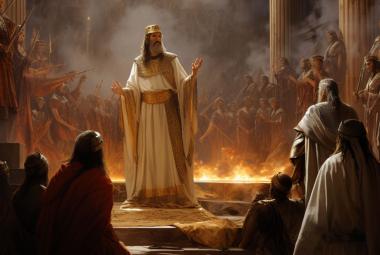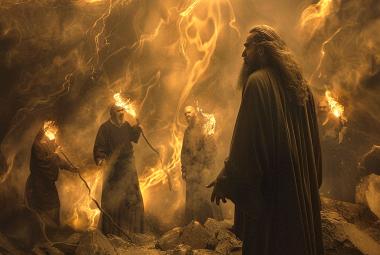Sometimes, I find it hard to understand the thought process people must go through to make their illogical choices. It seems there is a willful disconnect between choice and consequence. Driven by a kind of data-free decision-making, they seem to launch themselves over the barriers of evidence into the free fall of blind passion.
The Test for Truth
One such incident took place at the last mock trial of Jesus. Following five previous trials on the same morning as His betrayal by Judas, Jesus stood before Pilate one last time. The previous three religious trials all ended with a judgment of “death.” In the two preceding Roman trials, the court declared Jesus as “not guilty” based on the simple process of examining the available evidence and giving a fair judgment. We read in Luke’s gospel,
Then Pilate, when he had called together the chief priests, the rulers, and the people, said to them, “You have brought this Man to me, as one who misleads the people. And indeed, having examined Him in your presence, I have found no fault in this Man concerning those things of which you accuse Him; no, neither did Herod, for I sent you back to him; and indeed nothing deserving of death has been done by Him.”1
Nevertheless, Pilate was confronted by an irrational mob that wanted to see Jesus crucified. Thus, the gospels describe the political maneuvering of a Roman governor caught in the middle of an emotional firestorm that could have wide-reaching implications for his personal career.
Now at the feast the governor was accustomed to releasing to the multitude one prisoner whom they wished. And at that time they had a notorious prisoner called Barabbas. Therefore, when they had gathered together, Pilate said to them, “Whom do you want me to release to you? Barabbas, or Jesus who is called Christ?” For he knew that they had handed Him over because of envy. While he was sitting on the judgment seat, his wife sent to him, saying, “Have nothing to do with that just Man, for I have suffered many things today in a dream because of Him.” But the chief priests and elders persuaded the multitudes that they should ask for Barabbas and destroy Jesus. The governor answered and said to them, “Which of the two do you want me to release to you?” They said, “Barabbas!” Pilate said to them, “What then shall I do with Jesus who is called Christ?” They all said to him, “Let Him be crucified!” Then the governor said, “Why, what evil has He done?” But they cried out all the more, saying, “Let Him be crucified!” When Pilate saw that he could not prevail at all, but rather that a tumult was rising, he took water and washed his hands before the multitude, saying, “I am innocent of the blood of this just Person. You see to it.” And all the people answered and said, “His blood be on us and on our children.” Then he released Barabbas to them; and when he had scourged Jesus, he delivered Him to be crucified.2
How did this crowd of accusers become so full of hatred that they were willing to free a notorious prisoner to see Jesus executed instead? If we could turn back the clock, we would see a different story altogether. Four days previously, Jesus had ridden into Jerusalem to people laying down palm branches, singing Messianic Psalms, and crying out “Hosanna!”3 When you consider the good that was done during the public ministry of Jesus, you can easily understand their excitement at His arrival at the Passover Feast. After all, by now, He had healed all manner of sickness, fed five thousand in one sitting from a small child’s lunch4 and then again, He fed four thousand from “seven loaves, and a few little fish.”5 I think it is safe to say that the works of Jesus clearly sent the message to the masses that He was a caring and generous man.
The Tide of Crazy
How did the tide of public opinion concerning Jesus change so violently? Pilate’s shocked reaction sums up his astonishment when he asks, “What evil has He done?” Here, we see what happens when the masses are influenced by the elite. Matthew records, “the chief priests and elders persuaded the multitudes that they should ask for Barabbas and destroy Jesus.”6
The power of persuasion is a rhetorical weapon that can change the direction of the most resolute disciple. It can fill their mind with thoughts that cloud their understanding and twist their once-solid foundation into anti-logic rubble. Ultimately, this was not a choice of which man was to go free. It was ultimately a choice of which power would dominate the masses and dictate the course of their thinking. The conclusion of this final trail was that the judge was overruled and public opinion gave the sentence. Justice was not served. Truth was trampled under the feet of the mob that had been manipulated by the elite whose sole purpose was to silence their opposition.
Finding Truth in the Midst of Tumult
It is believed that Mark Twain said in jest, “Never let the truth get in the way of a good story.” I can completely understand his meaning from the point of view that he was a writer of fiction. But sadly, today, the elite that influence our day-to-day decisions are toxic news agencies that serve up their opinion as a replacement for information. Rather than informing the public, they seem totally focused on shaping public opinion.
Therefore, the modern public is caught in a quagmire of fake news, doctored photos/videos, and conspiracy mania. In this world of information overload, sound bites replace sound logic, and screaming slogans replace open dialogue and meaningful debate. Amid all this confusion, people are quite happy to make resolute decisions based on a cartoon character representation of some very complicated issues.
Objectification of the opposition is the first line of offense. This is achieved by characterizing the enemy in simple offensive terms. In the example of Jesus, the elite characterized him as a threat to Rome and their temple. Once the mindset of objectification by characterization has been established, it is an easy step toward the villainization of those they deem to be a threat. Therefore, these “things” are not only inanimate objects, but they present a clear and present danger that must be eliminated. Here, we see the power of propaganda that sets in motion the wheels of fear that drive hatred to its ultimate solution.
In the case of the trial of Jesus, Pilate identified that the reason for their hatred of Jesus was because “…he knew that they had handed Him over because of envy.”7 While the works of Jesus clearly sent the message to the masses that He was a caring and generous man, the words of Jesus sent the message that exposed the evil deeds of the religious elite. In the end, this was not about a person but about power. Power that they believed would keep the elite safe from public exposure.
The Perverted Perception of Public Opinion
Today, in the court of public opinion, it is very common for various groups to vehemently express their views to gain public acceptance and eventually be presented as the majority view. In some cases, a majority in volume can constitute a majority of opinion as the screams of the minority drown out their opposition.
We see that the expression of the “popular will” can create a cacophony of discordant voices, leaving many baffled about the true meaning of majority rule. In far too many places around the world today, the expression of the “popular will” is nothing more than the unleashing of personal passions that have little, if any, concern for the good of the whole society. It can even create and promote genocidal policies toward those without a voice in the democratic process. The sad end of democracy is anarchy, where rival factions splinter the fabric of society in order to gain their own selfish means. Ultimately, this process turns into nothing but a horrible form of tyranny that is initiated and enforced by the self-appointed elite.
Under their crafty leadership, good can be perceived as evil and evil can be promoted as good. This type of societal direction is doomed to drag all mankind into the caldron of confusion. As confusion increases, so does fear which breeds division and ultimately destruction of the fabric of human society.
A Prophetic Parallel
As you review the Book of Judges, you are constantly struck by the images of people who are so bent on following after their own desires that they repeatedly find themselves ensnared by their appetites and subsequently enslaved by their enemies. By chapter 17 we are told, “In those days there was no king in Israel, but every man did that which was right in his own eyes.” Thus, for the remainder of the Books of Judges you read of the increasing depravity of a nation that has no room for the counsel nor correction of God. Here, I believe, we have a perfect picture of the disaster of democracy when the people have lost their moral compass.
We now live in an age when universally, it can be said, without fear of contradiction, that there “arose another generation after them, which knew not the LORD (The God of the Bible)” and “every man did that which was right in his own eyes.” Therefore, we now see the distress, disease, demise and destruction of modern society that was promised by God for Israel IF they were not faithful to follow His commandments. But let’s be fair: rebellion against God is an endemic problem that has existed throughout mankind’s history. Before the first global judgment by God, the condition of the world at that time sounds a lot like it could have been written about today.
The earth also was corrupt before God, and the earth was filled with violence. So God looked upon the earth, and indeed it was corrupt; for all flesh had corrupted their way on the earth. And God said to Noah, “The end of all flesh has come before Me, for the earth is filled with violence through them; and behold, I will destroy them with the earth.”
Genesis 6:11-13
Jesus gave us an important end-times prophetic insight when He said,
“And as it was in the days of Noah, so it will be also in the days of the Son of Man: They ate, they drank, they married wives, they were given in marriage, until the day that Noah entered the ark, and the flood came and destroyed them all. Likewise, as it was also in the days of Lot: They ate, they drank, they bought, they sold, they planted, they built; but on the day that Lot went out of Sodom it rained fire and brimstone from heaven and destroyed them all. Even so, will it be in the day when the Son of Man is revealed?”
Luke 17:26-30
Jesus goes on to say,
“And shall God not avenge His own elect who cry out day and night to Him, though He bears long with them? I tell you that He will avenge them speedily. Nevertheless, when the Son of Man comes, will He really find faith on the earth?”
Luke 18:7-8
Clearly, Jesus was predicting a predominantly corrupt world that would be hostile to the Gospel. Sounds like today, doesn’t it?
The Action Plan for the Church
If we track back to the nation of Israel’s seminal moment and its subsequent descent into destructive behavior, we can see an important predecessor’s influence.
“Israel served the LORD all the days of Joshua, and all the days of the elders who outlived Joshua, who had known all the works of the LORD which He had done for Israel.”
Joshua 24:31
These early elders of Israel were a constant source of instruction and correction, and they served to guide the people in the ways of God’s will. Simply put, the heart of man’s problem is in the heart of man. If man’s heart is turned toward God, then righteousness reigns. But if man’s heart turns away from God, then the wages of sin are paid in full. To counterbalance a world gone mad, Jesus told His disciples,
“You are the salt of the earth; but if the salt loses its flavor, how shall it be seasoned? It is then good for nothing but to be thrown out and trampled underfoot by men. You are the light of the world. A city that is set on a hill cannot be hidden. Nor do they light a lamp and put it under a basket, but on a lampstand, and it gives light to all who are in the house. Let your light so shine before men, that they may see your good works and glorify your Father in heaven.”
Matthew 5:13-16
The prevention of putrefaction is purification. Darkness cannot survive where light exists. Providing these purification influences should be the primary function of the Church today. The first-century followers of Jesus faced a predominately hedonistic society, which was not too dissimilar to what we see today. Confronted by many different pagan cultures, Greek philosophies, political corruption, and Roman excess, the early Church was focused on its prime objective, which was to “…Go into all the world and preach the gospel to every creature.”8 The early Church did not form an army, promote a political party, or in any way dilute their efforts to fully carry out their great commission. If you want to see change in the world around you, start with Good News that goes straight to the heart.
An Apostolic Epilog
At the end of the apostle Paul’s life, he was in prison, where he was surrounded by the reality of his own impending death. Injustice, social chaos, and political corruption were everywhere. Yet in the midst of these terrible times, he penned his last letter to Timothy in which he states,
“I charge you therefore before God and the Lord Jesus Christ, who will judge the living and the dead at His appearing and His kingdom: Preach the word! Be ready in season and out of season. Convince, rebuke, exhort, with all longsuffering and teaching. For the time will come when they will not endure sound doctrine, but according to their own desires, because they have itching ears, they will heap up for themselves teachers; and they will turn their]ears away from the truth, and be turned aside to fables. But you be watchful in all things, endure afflictions, do the work of an evangelist, fulfill your ministry.”
2 Timothy 4:1-5





